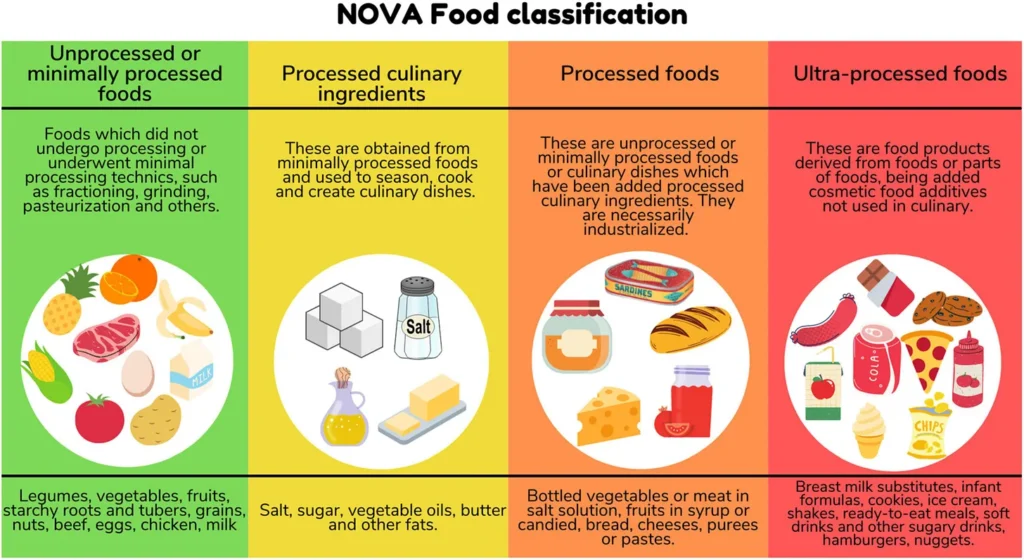A recent briefing by the UK Parliament r has spotlighted the potential health risks associated with ultra-processed foods (UPFs), reigniting debates over their classification and the implications for public health. The briefing, which compiles the latest academic research, reveals that high consumption of UPFs is linked to an increased risk of various health conditions, including obesity, type-2 diabetes, cardiovascular disease, and mental health issues. However, the complexity of these findings has spurred discussions about whether the health risks are inherent to the processing of these foods or related to their nutritional content.
What Are Ultra-Processed Foods?
UPFs are foods that have undergone significant industrial processing and are often ready-to-eat or heat. These foods typically contain additives, preservatives, and other ingredients not found in traditional home cooking. Common examples include crisps, ice cream, biscuits, soft drinks, and plant-based meat substitutes. They are usually high in calories, saturated fats, sugars, and salts, while being low in essential nutrients like fiber and vitamins.
Health Implications of UPFs
The briefing highlights the growing body of evidence linking UPF consumption to negative health outcomes. Studies suggest that regular consumption of these foods is associated with increased rates of obesity, type-2 diabetes, cardiovascular diseases, and various cancers. Furthermore, emerging research points to the potential impact of UPFs on gut health, with some studies indicating that these foods may alter the gut microbiome in ways that contribute to inflammation and other health issues.
Despite these concerns, the briefing acknowledges that it is not entirely clear whether the health risks are directly caused by the industrial processing of these foods or if they stem from their nutritional profile—being energy-dense, high in sugars, fats, and salts, and low in beneficial nutrients like fibre and micronutrients.
The Nova Classification Controversy
Central to the debate is the Nova classification system, which categorizes foods based on the extent of their processing. While Nova has been widely adopted in nutritional research and public health guidelines, it has also been criticized for its broad categorization. The system groups a wide range of foods under the UPF category, from sugary snacks to nutrient-dense, fortified products, which may lead to overly simplistic assessments of food quality.
 The Urban Co-Op
The Urban Co-Op
Some experts argue that the Nova system can unfairly stigmatize certain UPFs that are affordable and nutrient-dense, such as fortified cereals or certain plant-based alternatives. They suggest that these foods can play a valuable role in a balanced diet, particularly for those with limited access to fresh produce. The briefing paper underscores the need for a more nuanced approach to food classification, one that considers both processing levels and nutritional content.
Research Challenges and Future Directions
The briefing paper also highlights several challenges in UPF research. Accurately measuring individual exposure to UPFs is complex, given the wide variation in dietary habits and food composition. Additionally, confounding factors such as socioeconomic status, lifestyle choices, and genetic predispositions can complicate the analysis of UPF consumption and its health impacts. Biases in study design, particularly recall bias in dietary studies, further muddy the waters.
To address these challenges, the briefing calls for the adoption of advanced research methodologies. These include the use of digital food diaries, which can provide real-time data on food consumption, and the integration of “nutriomics,” a field that studies the interaction between nutrition and gene expression. The development of biomarkers specific to UPF consumption and the application of machine learning and AI to analyze large datasets are also recommended as ways to enhance the accuracy and depth of UPF research.
Conclusion
The UK Parliament briefing on ultra-processed foods has brought to light important concerns about the health risks associated with these products and the limitations of current classification systems. While the link between UPFs and various health issues is becoming increasingly clear, there remains significant debate about the underlying causes of these risks. The briefing emphasizes the need for more sophisticated research to better understand how UPFs affect human health and to develop more accurate and fair methods of food classification. As UPF consumption continues to rise, particularly in Western diets, these insights will be crucial in shaping effective public health policies and dietary recommendations.
For more information visit:
https://researchbriefings.files.parliament.uk/documents/POST-PB-0059/POST-PB-0059.pdf

